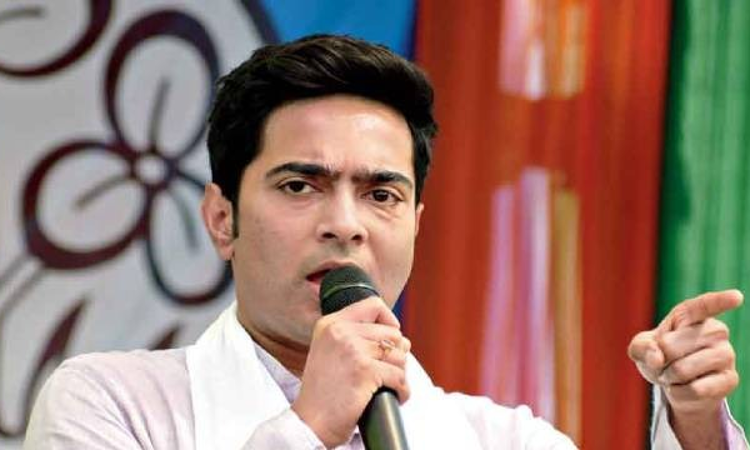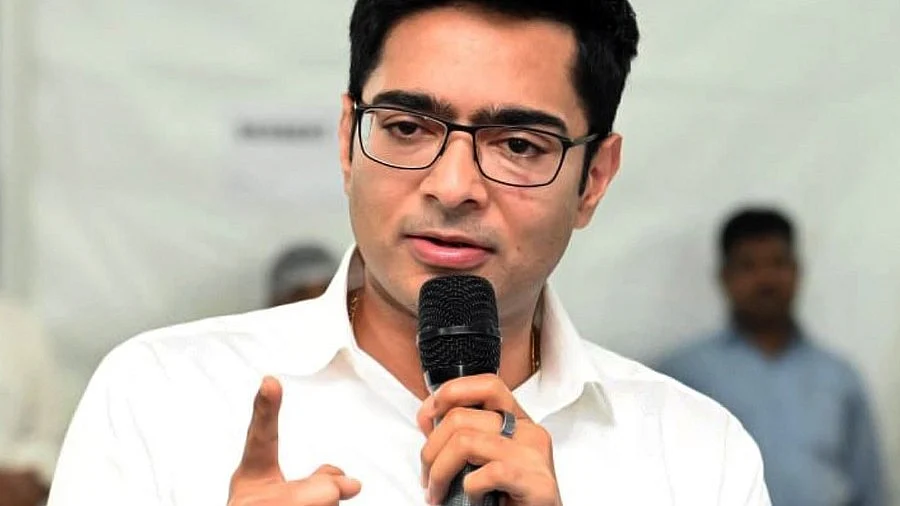
Abhishek Banerjee, a prominent political figure and Member of Parliament, has once again made headlines with his bold and unfiltered remarks during a recent event in Singapore. In a statement that has resonated across international platforms, Banerjee alleged connections between top officials of the Pakistani Army and terrorist factions. His assertions, made with unwavering conviction, have ignited widespread discussions, stirring the geopolitical pot between India and Pakistan.
The Context: A Funeral and Its Unseen Attendees
Abhishek Banerjee’s statement emerged from what he claimed to be credible reports indicating the attendance of senior Pakistani military officials at the funerals of prominent terrorists. This revelation, according to Banerjee, speaks volumes about the implicit support structures that sustain global terrorism. While the MP refrained from citing specific sources, the implication of his words was clear—a direct call for accountability and transparency in a region fraught with tension.
Banerjee’s remarks were not delivered in isolation. The setting was a high-profile seminar in Singapore, focusing on South Asian security dynamics. With delegates from various countries present, including diplomats and strategic analysts, Banerjee’s pointed remarks created a ripple effect, drawing attention to the deep-rooted issues plaguing Indo-Pak relations. The seminar’s theme—“Unveiling South Asia’s Geopolitical Complexities”—provided a fitting backdrop for Banerjee’s forthrightness, ensuring his words captured the attention of global policymakers.
Unmasking the Allegations: A Bold Stance
While allegations of state-sponsored terrorism against Pakistan are not new, Banerjee’s comments carry weight due to his political stature and the platform he chose for his remarks. His use of the Singapore event underscores his intention to highlight the issue on a global stage, ensuring that the narrative reaches an international audience. Banerjee’s delivery was characterized by meticulous detail and unyielding confidence, leaving little room for ambiguity in his accusations.
The timing of Banerjee’s statements is also noteworthy. With rising incidents of cross-border terrorism and the ongoing global fight against extremist ideologies, his words resonate with a broader call for unified action. Banerjee’s direct approach—uncompromising and firm—has been lauded by many within India as a sign of leadership that prioritizes national interest above all else. His insistence on linking such incidents to systemic patterns further emphasizes the need for global vigilance.
Reactions from Across the Spectrum
Banerjee’s statements have elicited mixed reactions. Within India, his words have been met with widespread support. Many view his stance as a necessary counter to Pakistan’s repeated denials of involvement in cross-border terrorism. Social media platforms were abuzz with hashtags supporting Banerjee, reflecting the sentiment of a populace tired of enduring the consequences of such activities. Political leaders, strategic analysts, and citizens alike praised his courage in addressing an issue that many deem crucial for national security.
Conversely, Pakistan has predictably refuted the claims, labeling them as baseless and politically motivated. Officials in Islamabad issued statements denying any such attendance at terrorist funerals, accusing Banerjee of perpetuating falsehoods to tarnish Pakistan’s international image. The diplomatic row has only intensified, with both nations exchanging sharp rhetoric in the days following Banerjee’s remarks. Pakistan’s response, which included summoning India’s envoy for a formal protest, underscores the gravity with which Islamabad views these allegations.
International observers, too, have weighed in. Strategic analysts and foreign policy experts have underscored the importance of verifying such claims, while also acknowledging the historical patterns of support that lend credibility to Banerjee’s assertions. The discourse has reinforced the need for transparency and accountability in addressing global terrorism. In particular, think tanks in the West have taken note of Banerjee’s statement, with many calling for independent investigations to corroborate his allegations.
Bridging Diplomacy and National Interest
Abhishek Banerjee’s statements also highlight the delicate balancing act required in international diplomacy. While his remarks serve as a clarion call for action, they also pose a challenge for India’s foreign policy machinery. The Indian government must now navigate the fallout of these revelations while maintaining its broader diplomatic objectives. Striking a balance between asserting the truth and preventing further escalation is crucial in ensuring that the narrative remains constructive.

Banerjee’s critics argue that such blunt statements may escalate tensions unnecessarily. However, his supporters counter that silence or diplomatic niceties have often been misinterpreted as weakness, emboldening state and non-state actors to continue their nefarious activities. By taking a bold stance, Banerjee aligns himself with a growing sentiment among Indian citizens demanding a stronger and more assertive response to terrorism. His words echo a shared frustration, signaling that diplomatic restraint should not come at the cost of justice or security.
Historical Patterns: The Nexus Between State and Terrorism
Banerjee’s allegations draw attention to a historical pattern that has long been a subject of contention in South Asia. Numerous reports from global think tanks and intelligence agencies have highlighted Pakistan’s tacit support for terror outfits operating within its borders. While Pakistan has consistently denied these claims, evidence of training camps, funding channels, and logistical support for militant groups has surfaced repeatedly.
The funerals of terrorists—often attended by large crowds—have, on occasion, turned into public displays of support for their activities. The alleged presence of military officials at such events adds a new layer of complexity, suggesting not just passive tolerance but active endorsement. Such events, though rare in public discourse, reflect underlying tensions that continue to shape Indo-Pak relations. Banerjee’s remarks shine a spotlight on these practices, urging the global community to address their implications.
The international community, while aware of these patterns, has often been criticized for its inconsistent approach to addressing state-sponsored terrorism. Banerjee’s statement serves as a reminder of the need for sustained pressure and collaboration in dismantling these networks. His insistence on holding accountable not just the perpetrators but also their enablers marks a significant shift in narrative, one that prioritizes prevention over reaction.
Moving Forward: The Need for Global Consensus
In light of Banerjee’s revelations, the international community faces a renewed imperative to address the roots of terrorism. Global platforms like the United Nations and its specialized agencies must intensify efforts to curb state-sponsored extremism. The narrative should shift from mere condemnation to actionable strategies, ensuring that nations abetting terrorism face tangible consequences. The global war on terror requires not just punitive measures but also proactive strategies that address the socio-political factors enabling such activities.
For India, Banerjee’s remarks serve as a rallying cry for stronger domestic policies and international advocacy. The government must leverage this opportunity to present a cohesive case against Pakistan’s alleged complicity, using credible evidence to sway global opinion. Collaboration with allied nations, intelligence sharing, and strategic alliances are critical in ensuring that Banerjee’s words translate into impactful action.
The role of media, too, cannot be understated. By amplifying the voices of those like Banerjee and ensuring that such revelations remain in public discourse, journalists and news outlets play a pivotal role in shaping narratives. The responsibility of presenting facts, maintaining objectivity, and fostering informed debate is more crucial than ever.
A Call to Action: Strengthening India’s Security Apparatus
Banerjee’s remarks also underscore the need for introspection within India’s own security and intelligence framework. Strengthening border security, enhancing counter-terrorism capabilities, and fostering regional cooperation are essential in mitigating threats. Investments in technology, intelligence-sharing mechanisms, and personnel training can significantly bolster India’s ability to preempt and respond to challenges.
Moreover, fostering dialogue within the South Asian region remains a critical, albeit challenging, goal. While Banerjee’s statements focus on accountability, they also highlight the underlying need for trust-building measures that address the root causes of animosity. Initiatives aimed at economic collaboration, cultural exchange, and conflict resolution may serve as complementary strategies in reducing hostility.
Conclusion: A Statement That Resonates
Abhishek Banerjee’s blunt statement in Singapore marks a pivotal moment in the ongoing discourse surrounding terrorism in South Asia. His words, though polarizing, reflect a broader truth that cannot be ignored. As the dust settles on this diplomatic storm, one thing remains clear—the fight against terrorism requires unwavering determination and a united front. Banerjee’s stance may have ruffled feathers, but it has also reignited a crucial conversation that the world can no longer afford to sideline.
His ability to articulate concerns that resonate across borders exemplifies the leadership required to navigate the complexities of modern geopolitics. As nations grapple with the challenges of extremism, Banerjee’s words stand as a testament to the power of conviction in driving change. The path forward, while fraught with challenges, is illuminated by the courage of those willing to speak out—a reminder that the quest for justice and security is a collective endeavor, demanding action from all corners of the globe.

